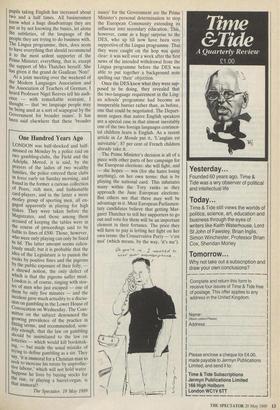One Hundred Years Ago
LONDON was half-shocked and half- amused on Monday by a police raid on two gambling-clubs, the Field and the Ade1phi. Moved, it is said, by the prayers of the ladies of two wealthy families, the police entered these clubs in force early on Sunday morning, and found in the former a curious collection of Peers, rich men, and fashionable card-players, and in the latter a more motley group of sporting men, all en- gaged apparently in playing for high stakes. They were taken before the Magistrates, and those among them accused of keeping the tables were in the course of proceedings said to be liable to fines of £500. Those, however, who were only playing can only be fined 6s 8d. The latter amount seems ridicu- lously small; but it is probable that the idea of the Legislature is to punish the rooks by positive fines and the pigeons by the public exposure of their folly, a shrewd notion, the only defect of which is that the pigeons suffer most. London is, of course, ringing with stor- ies of men who just escaped — one of them by only five minutes — and the incident gave much actuality to a discus- sion on gambling in the Lower House of Convocation on Wednesday. The Com- mittee on the subject denounced the growing prevalence of the practice in fitting terms, and recommended, sens- ibly enough, that the law on gambling should be assimilated to the law on lotteries — which would kill bookmak- ing, — but made the usual mistake of trying to define gambling as a sin. They say, 'it is immoral for a Christian man to seek to increase his estate by unproduc- tive labour,' which will not hold water. Suppose he lives by buying stocks for the rise, or playing a barrel-organ, is that immoral?
The Spectator, 18 May 1889


































































 Previous page
Previous page